Comprehensive Guide to Hard Floor Cleaning
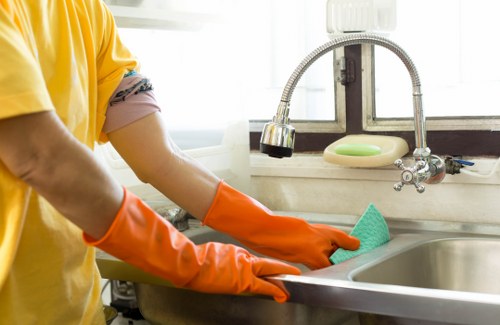
Maintaining clean hard floors is essential for both aesthetic appeal and longevity. Whether you have hardwood, tile, laminate, or vinyl floors, regular cleaning ensures that they remain in top condition. In this article, we delve into effective methods and tips for hard floor cleaning that cater to various types of flooring.
Hard floors are a significant investment in any home or commercial space. Proper maintenance not only preserves their appearance but also extends their lifespan. Neglecting regular cleaning can lead to scratches, stains, and wear, making the floors look dull and outdated.
Understanding the right cleaning techniques for your specific type of hard floor is crucial. Each material has its unique characteristics and requires tailored care to prevent damage and maintain its natural beauty.
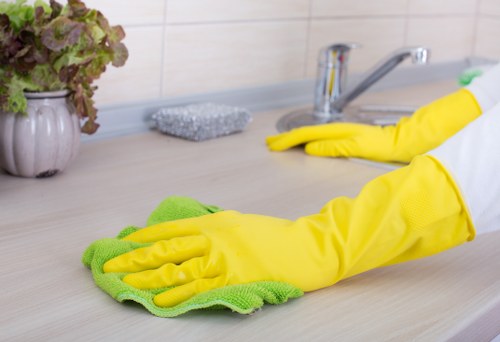
Types of Hard Floors
Before diving into cleaning methods, it's important to recognize the different types of hard floors available. Each type has distinct properties that influence the cleaning approach.
- Hardwood: Known for its classic and warm appearance, hardwood floors are made from solid wood and offer durability and timelessness.
- Laminate: A budget-friendly alternative to hardwood, laminate floors mimic wood patterns using a composite material with multiple layers.
- Tile: Available in ceramic and porcelain, tile floors are water-resistant and ideal for areas with high moisture.
- Vinyl: Versatile and easy to maintain, vinyl floors come in various styles, including sheets, tiles, and planks.
Each type of hard floor requires specific cleaning products and techniques to ensure optimal care without causing damage.
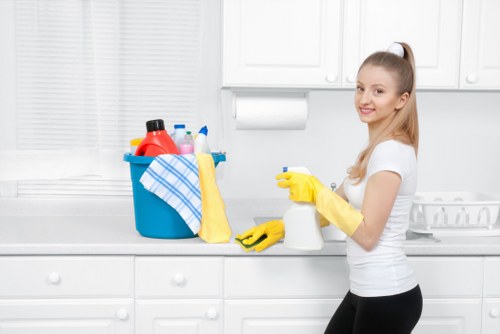
Essential Tools for Hard Floor Cleaning
Basic Cleaning Supplies
Having the right tools makes hard floor cleaning more efficient and effective. Here are some essential supplies to keep on hand:
- Broom or Dust Mop: For regular sweeping to remove dust and debris.
- Mild Detergent: Suitable for most hard floors, it helps in removing dirt without leaving residues.
- Microfiber Mop: Ideal for both dry and damp cleaning, microfiber mops capture dirt efficiently.
- Bucket: Necessary for mixing cleaning solutions and rinsing mops.
- Protective Gloves: To safeguard your hands from harsh cleaning agents.
Using the right tools not only simplifies the cleaning process but also ensures that your floors are cleaned without any damage.
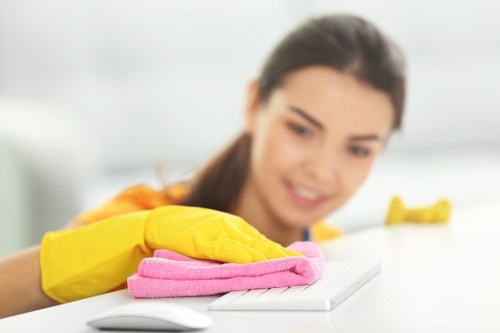
Cleaning Techniques for Different Floor Types
Hardwood Floors
Hardwood floors require gentle care to maintain their natural sheen. Here's how to clean them effectively:
- Sweep or Dust: Regularly remove dust and debris to prevent scratches.
- Mop with Care: Use a damp microfiber mop with a mild hardwood cleaner. Avoid excessive water.
- Spot Cleaning: Address spills immediately to prevent stains and warping.
- Use Rugs: Place rugs in high-traffic areas to minimize wear and tear.
Proper maintenance of hardwood floors ensures their durability and timeless beauty for years to come.
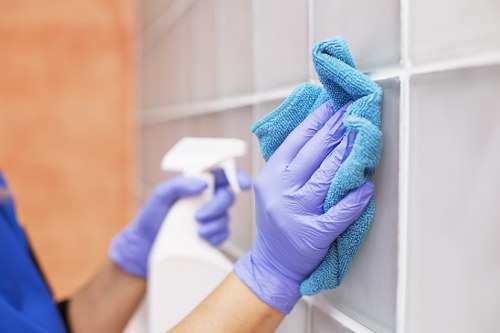
Advanced Cleaning Tips
Dealing with Stubborn Stains
Sometimes, regular cleaning isn't enough to remove tough stains. Here are advanced tips to tackle stubborn marks:
- Baking Soda Paste: Mix baking soda with water to form a paste. Apply it to the stain, let it sit for a few minutes, and then gently scrub.
- Vinegar Solution: For tile floors, a mixture of equal parts vinegar and water can help remove mineral deposits and grime.
- Commercial Cleaners: Use specialized cleaners designed for specific floor types to tackle persistent stains.
Always test any cleaning solution on a small, inconspicuous area before applying it to the entire floor to ensure it doesn't cause discoloration or damage.

Preventive Measures
Prevention is better than cure when it comes to maintaining hard floors. Implement these measures to keep your floors pristine:
- Use Doormats: Place mats at entrances to reduce the amount of dirt and moisture brought indoors.
- Furniture Pads: Attach felt pads to furniture legs to prevent scratches when moving items.
- Control Humidity: Maintain appropriate humidity levels to prevent wood floors from expanding or contracting.
- Avoid Harsh Cleaners: Steer clear of abrasive or acidic cleaning agents that can damage the floor surface.
By taking these preventive steps, you can significantly reduce the wear and tear on your hard floors.

Eco-Friendly Cleaning Solutions
For those who prefer environmentally friendly cleaning methods, there are several sustainable options available:
- Vinegar and Water: A natural disinfectant that effectively cleans without harmful chemicals.
- Castile Soap: A vegetable-based soap that's safe for most hard floors and eco-friendly.
- Baking Soda: Useful for scrubbing and deodorizing floors naturally.
- Essential Oils: Add a few drops to your cleaning solution for a pleasant fragrance without synthetic fragrances.
Using eco-friendly solutions not only benefits the environment but also creates a healthier living space for you and your family.

Routine Maintenance Schedule
Establishing a regular maintenance schedule ensures that your hard floors remain in excellent condition:
- Daily: Sweep or dust mop to remove surface dirt and prevent scratches.
- Weekly: Mop with a suitable cleaning solution to eliminate deeper grime.
- Monthly: Inspect for any damages or wear and address them promptly.
- Annually: Consider professional deep cleaning or refinishing services for hardwood floors.
Adhering to this schedule helps in maintaining the floors' appearance and structural integrity over time.

Choosing the Right Cleaning Products
Understanding Product Labels
Not all cleaning products are created equal. Here's how to select the right ones for your hard floors:
- pH-Balanced Cleaners: Ensure the cleaner is pH-neutral to prevent damaging the floor surface.
- Non-Abrasive: Avoid products that contain harsh abrasives which can scratch or dull the floor.
- Specific to Floor Type: Use cleaners formulated for your specific type of hard floor, whether it's wood, tile, laminate, or vinyl.
- Residue-Free: Choose products that leave no sticky residue to maintain the floor's natural shine.
Reading and understanding product labels can help you make informed decisions and protect your investment in your flooring.

Professional Hard Floor Cleaning Services
When to Consider Hiring Professionals
While regular DIY cleaning is essential, there are times when professional help is necessary:
- Deep Cleaning: Professionals have access to specialized equipment and products for thorough cleaning.
- Repairs and Refinishing: Addressing significant scratches, dents, or wear requires expert intervention.
- Time Constraints: If you lack the time or resources for proper cleaning, hiring professionals ensures the job is done efficiently.
- Commercial Spaces: High-traffic areas in businesses may require regular professional maintenance to keep floors looking their best.
Investing in professional cleaning services can save you time and ensure your hard floors are maintained to the highest standards.

Final Thoughts
Maintaining clean hard floors is a blend of regular upkeep, using the right tools and products, and knowing when to seek professional help. By following the guidelines outlined in this article, you can ensure that your hard floors remain beautiful and durable for years to come.
Remember, the key to effective hard floor cleaning lies in understanding the unique requirements of your flooring type and committing to a consistent maintenance routine.
For expert assistance and top-notch hard floor cleaning services, contact us today and let our professionals help you maintain the elegance and longevity of your floors.






